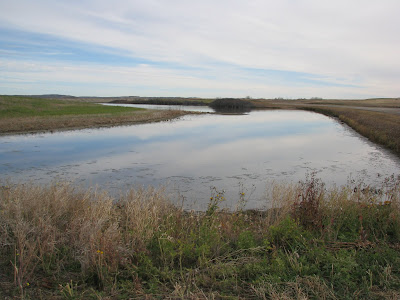. . . give me discernment
 |
| Parkland Pond - East on 312 |
Psalm 119 is the longest Psalm.
Commentary says it's an acrostic poem, which has each stanza begin
with one of the 22 letters of the Hebrew alphabet in sequence. As
in English poetry, the writer has chosen to marry his themes with a
familiar form: in English literature, the sonnet, the haiku, free
verse, blank verse, couplet, etc. are forms (along with others) that
marry recognizable style with content. Rhyme schemes, rhythm, and a
host of rhetorical devices have been meat for English studies in high
schools and universities for centuries.
Our hymns provide us with good examples
of marrying content to form. In order to be sung, the words and
phrases of the content must be written so that they can fit into a
musical whole.
The theme of Psalm 119 isn't
complicated; I've picked out two verses in it (to open this
meditation) that more or less summarize that theme. Creator God has
set down for our benefit laws (precepts, statutes) which we must seek
out and apply to our lives in order to remain in God's favour. We
need God's help in finding and understanding His precepts, but our
sincere attempt to keep them in sight in all we do will carry us
through hardship and persecution, although we may feel like we're far
from God from time to time.
Psalm 119 is certainly a “both feet
on the ground” poem. Like us, the narrator longs to know and
understand the precepts that govern the universe, the earth and the
people who live on it. Time and again, he expresses doubts in the
details but at the same time, an unwavering trust in God's good grace and care for him.
We have, of course, noted the interplay of doubt and trust in other
Psalms, in Ecclesiastes, in Job. (For those who haven't read Peter
Enns' The Sin of Certainty, you
can read my review of it HERE.)
Although the writer of Psalm 119 (or the redactors who gave it its
final form) didn't use the words, the thought, “Why do bad things
happen to good people?” must have cropped up repeatedly.
The
Psalms occupy a special place for us, if only because when we're referred
to them, we just open our Bibles in the exact middle and there they
are! They are also various and—dare I say—honest in that the bit,
or great deal, of manic/depression we all experience is there to help
us gain perspective.
The
whole of Psalm 119 is available for your enjoyment
contemplation and will pop up if you click HERE.



Comments
Post a Comment